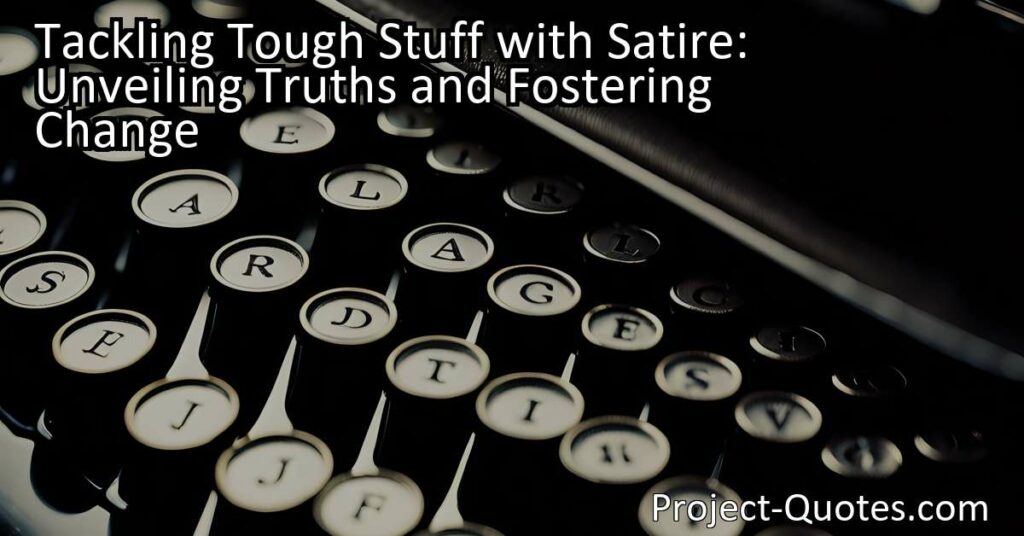It is difficult not to write satire.
Juvenal
Tackling Tough Stuff with Satire: Unveiling Truths and Fostering ChangeSatire is like a clever superhero’s shield that allows you to tackle tough stuff without making it too heavy. By using humor and exaggeration, you can shed light on unfairness and make people think. Satire gets people talking and can ultimately lead to positive change.
Table of Contents
Meaning of Quote – It is difficult not to write satire.
Hey there! You’re probably wondering about this quote by a dude named Juvenal, right? He was a really cool poet from way back in ancient Rome, like a couple thousand years ago. And when he said, “It is difficult not to write satire,” he was onto something super interesting that we can talk about.
So, what’s satire? It’s like when you watch a funny movie or read a book that’s poking fun at something serious by exaggerating it or making it seem silly. It’s like drawing a mustache on a picture of a very serious person to make your friends laugh you’re showing how serious they are, but in a way that’s totally not serious. Satire is a way to use humor, irony, or even a little sarcasm to talk about problems or poke holes in the way things are in the world.
Now, when Juvenal says it’s hard not to write satire, he’s kind of chuckling to himself and saying, “Look, with all the crazy stuff going on around us, how can I NOT make fun of it?” ‘Cause, let me tell you, even though he lived a super long time ago, people haven’t changed all that much. We’re still dealing with a lot of the same issues like people being in charge who maybe shouldn’t be, folks being obsessed with money and fame, and all sorts of unfairness in society.
Imagine you’re hanging out at school, and you notice some of the funny or weird things that happen. Like, maybe there’s that one rule that doesn’t make any sense, or a friend who always (I mean always!) forgets their homework. It’s hard not to make a joke about it, right? It’s like your brain just sees the silly side of things and wants to point it out. That’s what Juvenal was getting at. The world is full of stuff that’s just begging to be made into a joke.
Now, the cool thing about satire is that it’s not just about making people laugh. It’s kind of like a clever disguise for some pretty deep thoughts. When you make a joke about something that’s not fair or right, you’re actually shining a light on it so people can see what’s wrong. You’re like a detective with a magnifying glass, except instead of searching for clues, you’re searching for the truth, and you’re using laughs as your flashlight.
Satire can be a mega-powerful tool. It’s like a superhero’s shield allowing you to tackle tough stuff without making it too heavy. For example, lets say there’s a rule at school that everyone thinks is super strict and doesn’t really help anyone. If you wrote a funny story about a school where the rules were so over-the-top that kids had to ask permission to blink, you’d be using satire. People would giggle because it’s so ridiculous, but they might also start thinking, “Hey, maybe some of our real rules are a bit much, too.”
What’s really epic about satire is that it gets people talking. Once you’ve got them chuckling, they’re way more likely to chat about whatever it was you were poking fun at. And talking leads to thinking, which can lead to changing things for the better. Imagine if your funny story about the super-strict school got people to discuss what rules should change. That would be a pretty awesome use of humor, wouldn’t it?
But here’s the thing: being good at satire takes some serious skill. You’ve got to be smart about it because it’s like walking a tightrope. Lean too far one way, and you might just be mean. Lean too far the other way, and no one gets the joke. You’ve got to hit that perfect balance where it’s funny, but also crystal clear that you’re trying to make a point.
One of the most famous modern examples of satire is “The Simpsons.” This cartoon family has been making people laugh for years by exaggerating things we see in real life, whether it’s poking fun at politics, culture, or even everyday family life. Yet through all the jokes and silliness, there’s often a message or a bit of truth about the world we live in.
But it’s not just cartoons that use satire. You’ll find it in movies, books, and even on social media. People love creating memes that take a funny image and add a caption that says something about the world in a way that makes you think, “Ha! So true!” even as you’re cracking up.
So, Juvenal was like the ancient version of a meme-maker or a cartoonist for “The Simpsons.” He saw all sorts of nutty, unfair, and just plain dumb stuff going on in ancient Rome, and he thought, “I’ve got to write about this.” But instead of just complaining or being a downer, he decided to use satire so people would actually want to hear what he had to say.
To wrap it all up, writing satire is kind of like being a comedian with a secret mission. You want to make everyone laugh, sure, but you also want them to walk away with a little nugget of truth or a new way of looking at the world. And even though it might seem hard not to write satire with all the material the world gives us, it’s also a pretty amazing way to get people to listen and maybe, just maybe, make a little change for the better. Cool, right?
I hope this quote inspired image brings you hope and peace. Share it with someone who needs it today!


